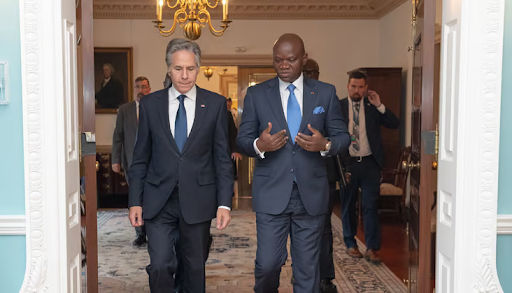Russia Avoids Western Sanctions in Alliance with Gabon
Russian tankers registered under the flag of Gabon in the ocean. (Photo: Getty Images)
Since the Russian invasion of Ukraine, Russian ship fleets have turned to countries outside of the Western economic world to dodge increasing sanctions and oil caps. While many countries have backed out of allegiances with Russia’s “dark fleet” of improperly registered oil tankers, Gabon has been crucial to Moscow’s dodging of sanctions.
Recently, Gabon’s ship registry, one of the fastest growing in the world since opening in 2018, has grown to include over 100 vessels.
Russia’s “dark fleet” has grown prominently during the Russia-Ukraine War by avoiding international pressure, registering 600 ships under various flags outside of Western jurisdiction, and forging fake satellite locations of ships to avoid letting them onto the ports they stop at.
Despite Gabon priorly being an important ally to the United States and France following the 2023 coup d’état by former President Ali Bongo Ondimba’s Republican Guard, the country has become increasingly friendly to Russia, particularly with President Putin.
The Russian Ministry of Foreign Affairs calls Gabon “one of Russia’s most promising partners in Equatorial Africa,” a partnership that extends Putin’s influence and allegiances with Africa. American officials still maintain positive standings with the new Gabonese transitional government.
Here’s how it works: Gabonese companies funnel Western materials to Russia and avoid freezing exports to Moscow. This process has allowed Gabon to become a key player in the Russian supply chain.
Gabon’s quick mass registration of tankers and leniency on safety and regulation has garnered a globally negative reputation. Gabon’s government does not control the registry; instead, it outsources to Intershipping Services LLC, which has stated that with Gabon, the company aims to “offer a high-level registry at a very competitive fee.”
Last year, a ship bearing the Gabon flag burst into flames off the coast of Malaysia, killing three crew members. This year, another tanker registered in Gabon was detained in the Gibraltar Strait after crew complaints about months of withheld compensation.
Many officials worry that Russia’s avoidance of international inspection and oversight regime raises concerns about potential tanker disasters and economic consequences. Russia’s fleet, including those under the flag of Gabon, do not follow the international maritime operations guidelines that ensure safety for the ships and crew. The ships don’t follow Western insurance or protection, rather being listed as insured by “unknown”. They frequently turn off their automatic identification systems, giving other countries an unrealistic radar that may not show where Russian ships really are in the water. They also do not undergo regular inspections or maintenance as is the case with regular fleets.
US Secretary of State Anthony Blinken welcomes Gabonese coup leader Brice Oligui Nguema in Washington October 2024. (Photo: Official State Department/Freddie Everett)
However, Gabon isn’t afraid of the increasing pressure from Western countries and has recently allowed Russia to register ships under the Gabonese flag, aiding them with their avoidance of oil caps and sanctions. In 2024, Russia switched over 85 vessels from Liberia, the previous country Russia allied with, to the Gabonese registry. Russian ships are adorned with flags from other African nations: Comoros and Cameroon.
Since Gabon’s growing relationship with Russia, its registry has become the second largest in Africa. The economic benefit for the country predicts no end to the relationship, foreboding many problems for years to come.
Western authorities continue to worry about Russia’s rejection of jurisdiction for oil caps imposed to thwart Russian economic operations throughout the war and the increasing cases of poor worker conditions on Gabon-registered vessels.
Russia’s persistent expansion of influence over Africa is essential to Moscow’s economic and political growth against Western adversity, and Gabon has just become a keystone to their agenda.


